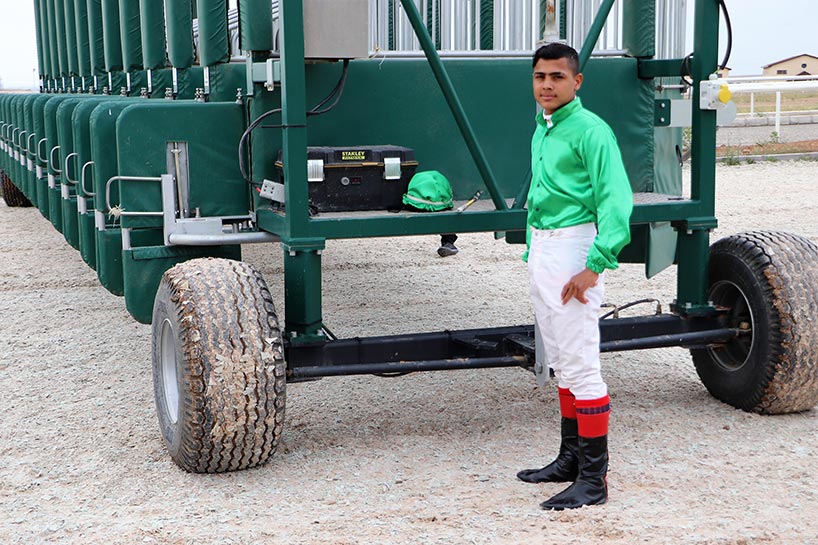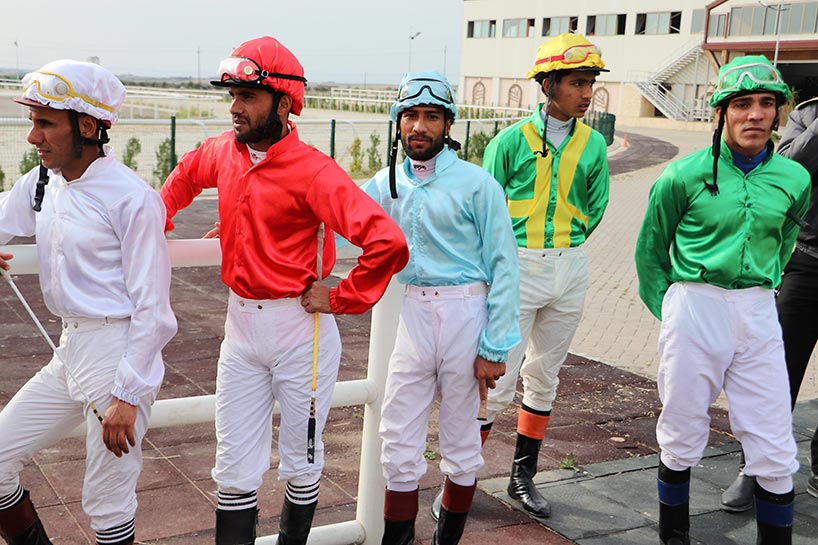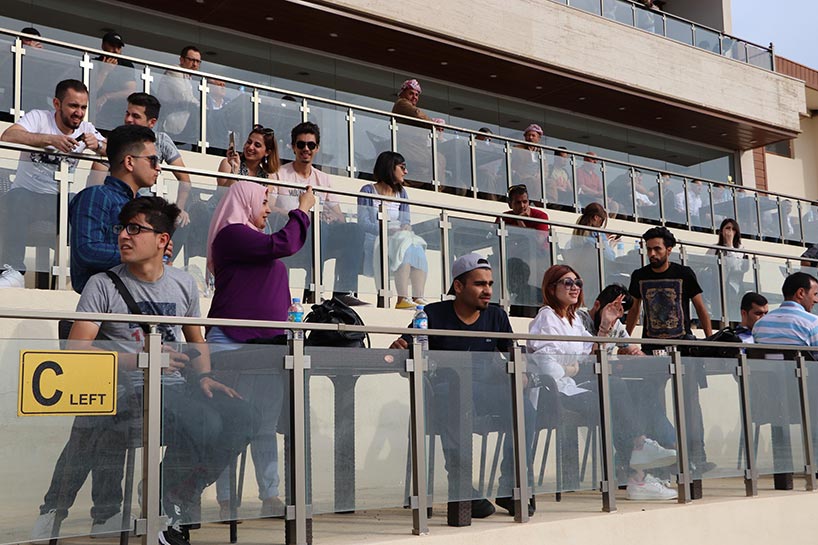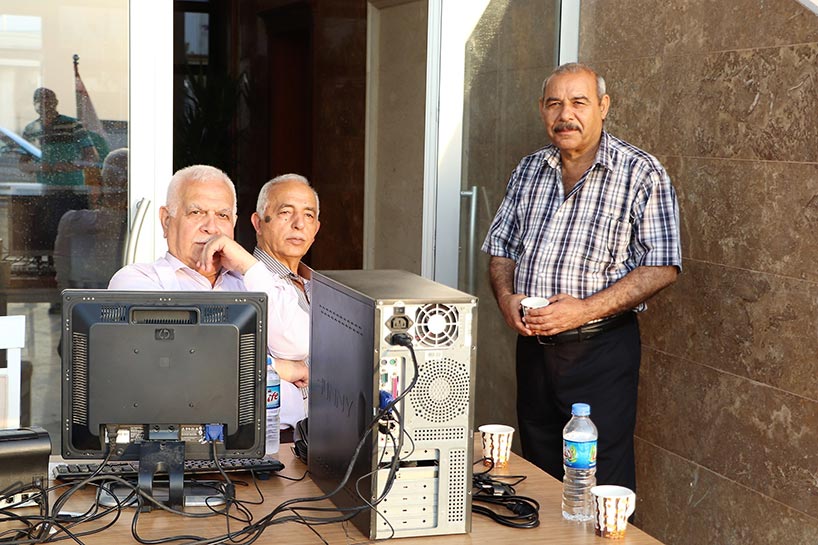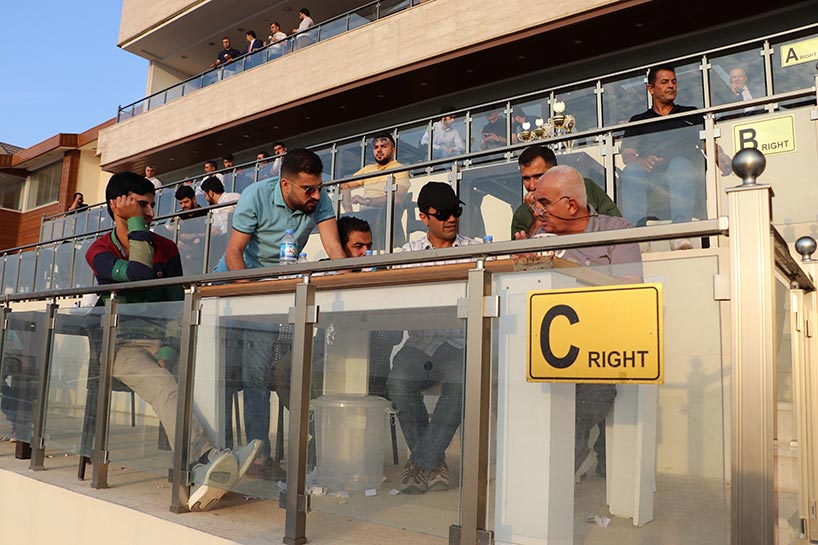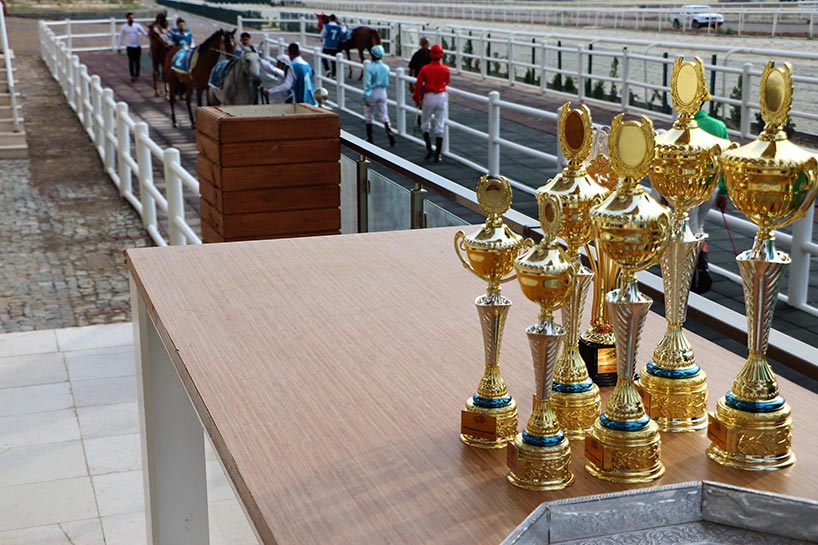9 Photos
Photo Gallery
In pictures: Bridging the Erbil-Baghdad gap one horse race at a time
ERBIL, Kurdistan Region — It’s race one at the Erbil International Equestrian Club weekly meeting of the Kurdistan Jockey’s Club. Handlers are loading a temperamental horse into the starting gate as it balks and tries to back away, as other horses are loaded-in in preparation for the start. Riders in their colourful red, blue, green, yellow and white silks mount their horses. They know exactly what to do as the platform becomes this giant shifting mass of horses, riders and their crew.
The marshal drops the red flag to signal the start and they’re off.
A crowd seated in the stands looks on. A small group sits around a table on the observation deck stand. A constant flow of Shisha pipes and tea is taken up in the traditional local Kurdish style.
Race one, horse No. 1, Milan, comes trotting into the winner’s circle, his jockey triumphant, posing proudly for photos as the horse’s owner comes down to receive the trophy.
Previously a domain only for men, these weekly racing events are attracting a more and more diverse crowd including families, teachers, NGO workers, and journalists.
“It just takes time build-up, like a little subculture here. There are definitely horse-crazy people and they have been but they've been kind off on their own, and so it's nice seeing them interact with each other more,” said Daniel Smith an American man who announces the races.
In the crowd this week, there’s a group of veterinary students from Sulaimani here.
“We are learning in university about the diseases and their management but about the training. We don't have a field in Sulaimani for horses. So we came here to see them in real life and action,” said Luna Khalid, a vet student from the International Vet Student Association.
Being large majestic animals, horses can easily fall ill if not managed correctly. Colic, abdominal pain related to diet, is a common disease among horses.
“Actually because there's not so much knowledge about horses and in the region people don't know the right way of managing them there are some problems related to the management but here in the club they're managing them based on the international standards,” said Laven Abdul Wahab Ahmed, a veterinarian from the University of Sulaimani.
“The problems here [in Kurdistan] are people are using horses not only for races but for their own draft and working horses. So there are problems related to the hooves, and the walking, and the joints and some diseases which the owners are not educated about.”
Equine diseases can be very serious as they spread quickly.
The club is trying to work with local farms on getting all horses vaccinated against diseases to reach international standards, according to Smith, so that horses can come in and go out.
Iraq has a long tradition of horse racing, mainly in Baghdad; however, weekly races are relatively new to Kurdistan having started in March 2017.
Each week, there are 3-4 races scheduled including, local, imported and Arabian horse breeds.
“The Nujafi family which is this really big old Mosul, Nineveh province family back to Ottoman times and they've been a big horse family for a long time,” said Smith. “There's a tradition of some of these families having been big horse families for centuries.
“So there is definitely a history of the racing but most of the horse racing was done in Baghdad and that's why the big crew comes up from Baghdad. They're used to doing it and selling the tickets and they're certain really specific ways of going about things in the equestrian world”.
Sabah Almukhtar leads a team of four computer operators and engineers from Baghdad. They are implementing an automated betting system. Once fully operational punters will be bet on a Win, Place. Quinella, Forcast, Triple or four horse sequence.
This week’s race was a trial run for the first two races, but it will be fully operational next week.
Up until now, people have been betting amongst themselves.
“Sometimes, even they don't know each other… So people are finding a way to bet waiting for it to get more official but it's happening anyway,” Smith said.
The horses come from surrounding areas such as Kirkuk, Diyala, and Baghdad as well as the jockeys who travel between Erbil and Baghdad to ride and mingle.
“The first time we had some Baghdad riders come up for a kind of a friendly competition between Erbil and Baghdad,” said Smith.
Kurdistan like Iraq has seen its share of fighting through the decades, so the relative pause in violence is welcomed.
“It's kind of neat seeing people get used to each other in different ways so every week it gets people who didn't know each other or talking or being more familiar with each other,” Smith said.
The last race event before Ramadan is taking place at the Erbil International Equestrian Club on Friday.
The marshal drops the red flag to signal the start and they’re off.
A crowd seated in the stands looks on. A small group sits around a table on the observation deck stand. A constant flow of Shisha pipes and tea is taken up in the traditional local Kurdish style.
Race one, horse No. 1, Milan, comes trotting into the winner’s circle, his jockey triumphant, posing proudly for photos as the horse’s owner comes down to receive the trophy.
Previously a domain only for men, these weekly racing events are attracting a more and more diverse crowd including families, teachers, NGO workers, and journalists.
“It just takes time build-up, like a little subculture here. There are definitely horse-crazy people and they have been but they've been kind off on their own, and so it's nice seeing them interact with each other more,” said Daniel Smith an American man who announces the races.
In the crowd this week, there’s a group of veterinary students from Sulaimani here.
“We are learning in university about the diseases and their management but about the training. We don't have a field in Sulaimani for horses. So we came here to see them in real life and action,” said Luna Khalid, a vet student from the International Vet Student Association.
Being large majestic animals, horses can easily fall ill if not managed correctly. Colic, abdominal pain related to diet, is a common disease among horses.
“Actually because there's not so much knowledge about horses and in the region people don't know the right way of managing them there are some problems related to the management but here in the club they're managing them based on the international standards,” said Laven Abdul Wahab Ahmed, a veterinarian from the University of Sulaimani.
“The problems here [in Kurdistan] are people are using horses not only for races but for their own draft and working horses. So there are problems related to the hooves, and the walking, and the joints and some diseases which the owners are not educated about.”
Equine diseases can be very serious as they spread quickly.
The club is trying to work with local farms on getting all horses vaccinated against diseases to reach international standards, according to Smith, so that horses can come in and go out.
Iraq has a long tradition of horse racing, mainly in Baghdad; however, weekly races are relatively new to Kurdistan having started in March 2017.
Each week, there are 3-4 races scheduled including, local, imported and Arabian horse breeds.
“The Nujafi family which is this really big old Mosul, Nineveh province family back to Ottoman times and they've been a big horse family for a long time,” said Smith. “There's a tradition of some of these families having been big horse families for centuries.
“So there is definitely a history of the racing but most of the horse racing was done in Baghdad and that's why the big crew comes up from Baghdad. They're used to doing it and selling the tickets and they're certain really specific ways of going about things in the equestrian world”.
Sabah Almukhtar leads a team of four computer operators and engineers from Baghdad. They are implementing an automated betting system. Once fully operational punters will be bet on a Win, Place. Quinella, Forcast, Triple or four horse sequence.
This week’s race was a trial run for the first two races, but it will be fully operational next week.
Up until now, people have been betting amongst themselves.
“Sometimes, even they don't know each other… So people are finding a way to bet waiting for it to get more official but it's happening anyway,” Smith said.
The horses come from surrounding areas such as Kirkuk, Diyala, and Baghdad as well as the jockeys who travel between Erbil and Baghdad to ride and mingle.
“The first time we had some Baghdad riders come up for a kind of a friendly competition between Erbil and Baghdad,” said Smith.
Kurdistan like Iraq has seen its share of fighting through the decades, so the relative pause in violence is welcomed.
“It's kind of neat seeing people get used to each other in different ways so every week it gets people who didn't know each other or talking or being more familiar with each other,” Smith said.
The last race event before Ramadan is taking place at the Erbil International Equestrian Club on Friday.




.jpg?scale=both&w=1140&h=750&bgcolor=2a2f33)







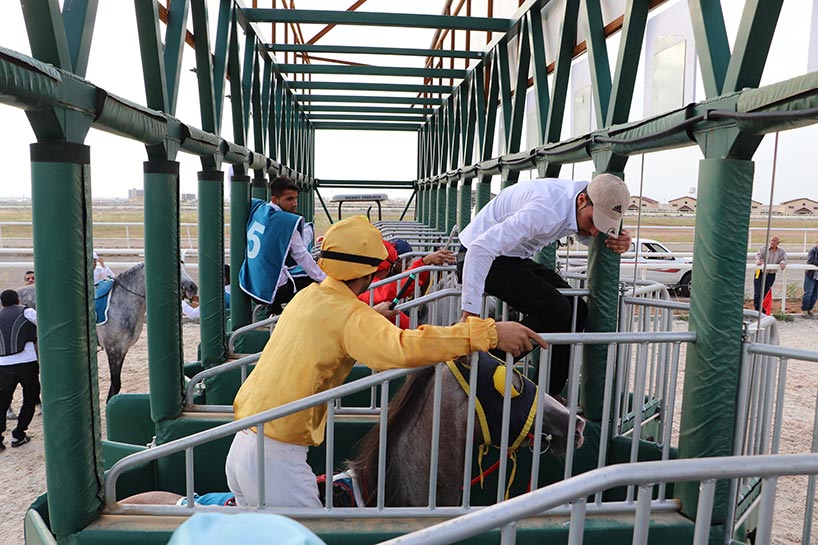
.jpg)
